In this article, we will compare The Motley Fool vs Morningstar in terms of offerings, target audience, investment strategies, pricing and more.
AI Investing
Table of Contents
When evaluating different investment platforms, you might have come across Morningstar Investor and Motley Fool.
Both have built strong reputations over the years by helping investors grow their wealth, but each serves a different type of investor.
In this article, we will compare Motley Fool vs. Morningstar in terms of offerings, target audience, investment strategies, and pricing. We'll also introduce a better alternative that provides real-time insights and event-driven stock alerts so you can find the best investments faster.

Morningstar Investor is an investment research and management platform that helps investors analyze their portfolios and make informed financial decisions.
The platform provides data-driven insights on several investment vehicles, including stocks, mutual funds, and ETFs. Each is backed by Morningstar’s ratings and independent analysis.
Morningstar also features comprehensive research reports and performance metrics. These capabilities help professional investors conduct their own research and evaluate their individual investments.
Plus, the built-in portfolio management tools allow users to track their holdings, assess risk, and evaluate the overall composition of their investments.
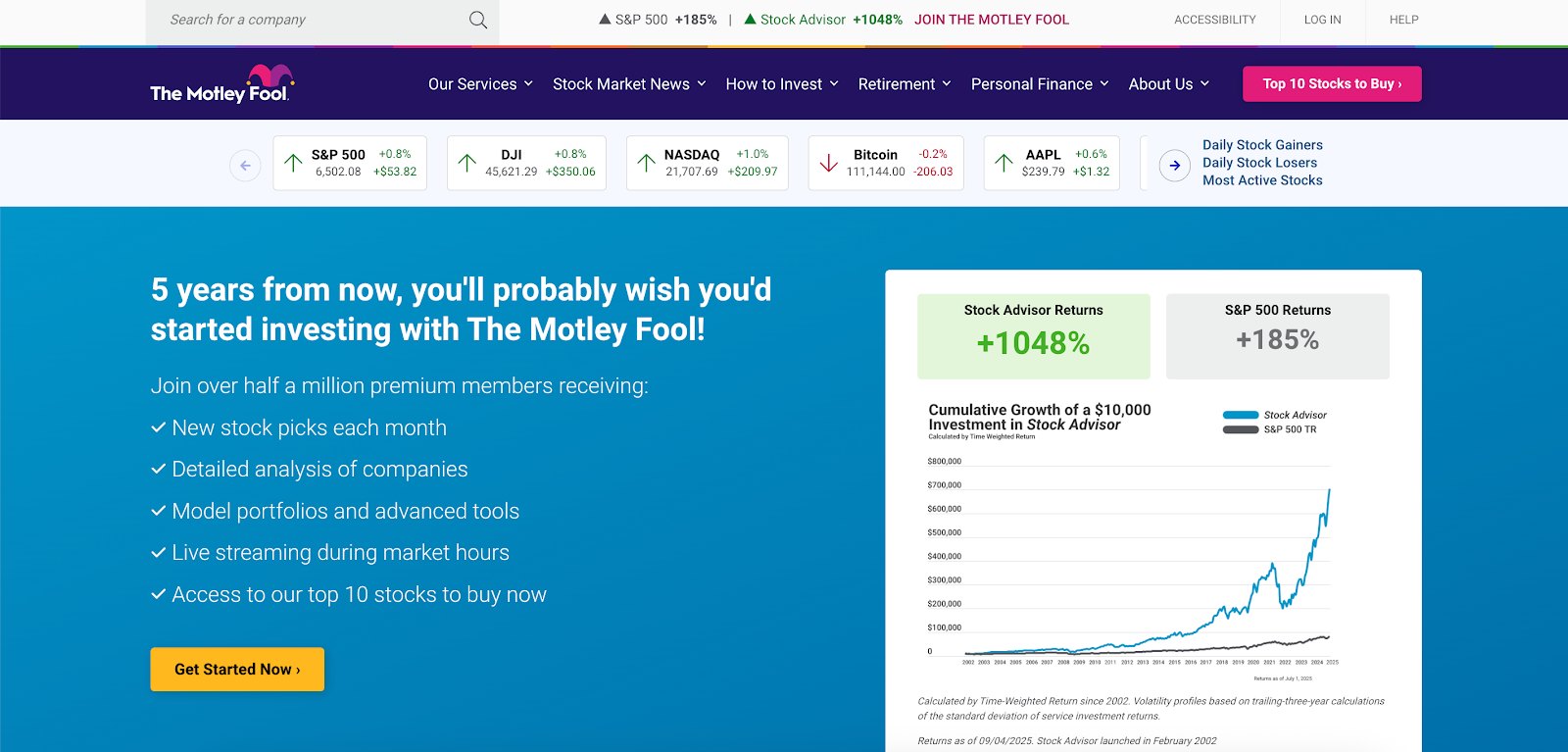
Motley Fool is an investment research company that provides a stock-picking service. The platform is designed for retail investors who are looking for guidance on building their portfolios over time.
Motley Fool's main focus is on offering stock market recommendations aimed at long-term growth. Through its services, users receive regular stock picks, financial insights, and market analysis.
The platform offers multiple subscription tiers, each providing a different level of access to stock recommendations and analytical tools.
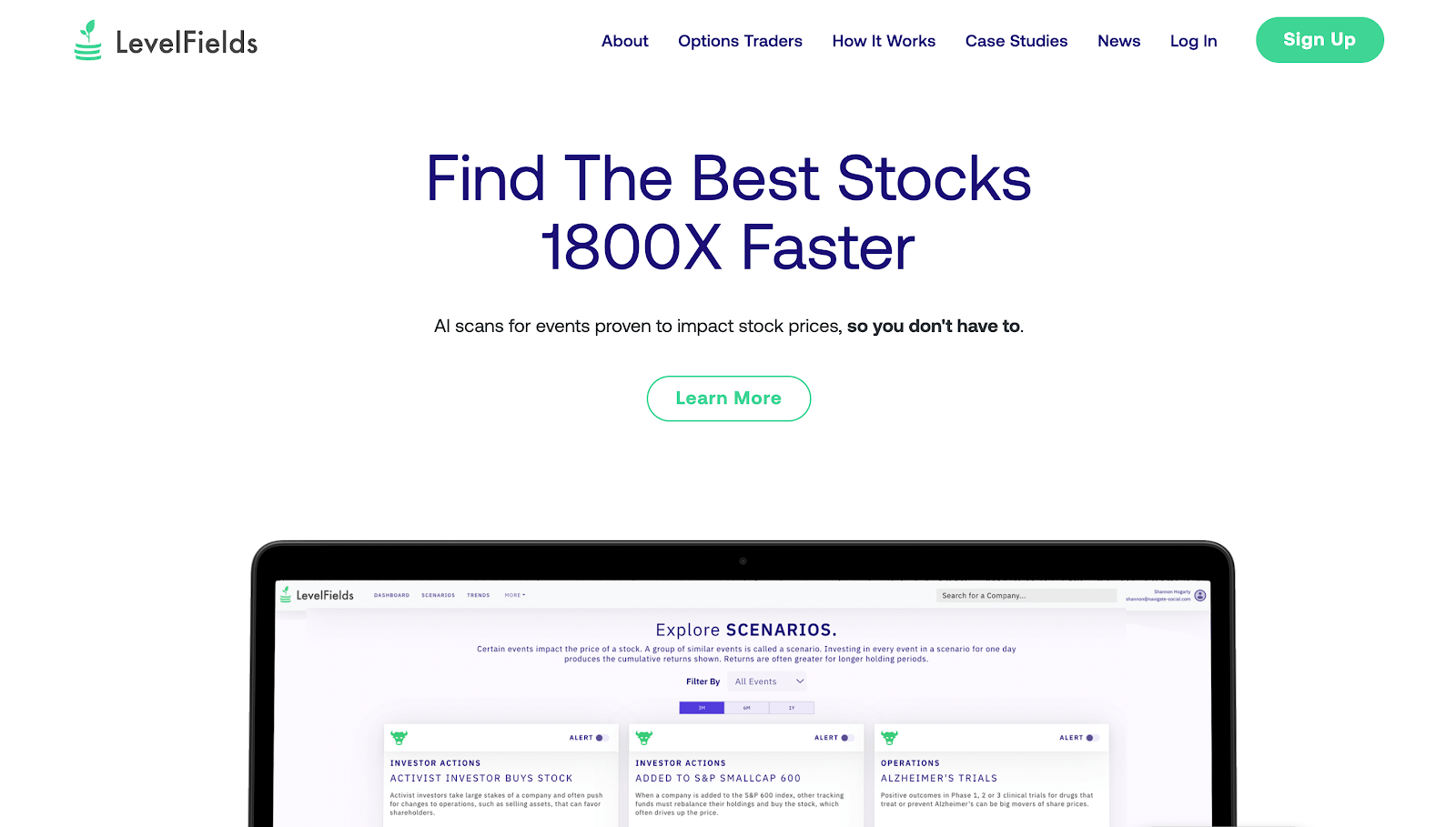
While Morningstar and Motley Fool dominate the conversation, most investors overlook a better alternative that goes beyond traditional stock research and picking services.
LevelFields is an AI-powered platform designed to let trades come to you. We notify you when prime trading opportunities come up by focusing on real-time, data-driven insights.
This eliminates the need to constantly scour for trade setups or ask for assistance from financial advisors.
The platform helps you find profitable trades by analyzing millions of events from various sources, such as:
LevelFields focuses on significant market-moving events, such as activist investments, CEO departures, or government actions, that can impact stock prices.
LevelFields also offers access to over 100 trading strategies. These strategies cover different conditions, including bear markets, to help you adapt based on current trends.
Plus, their premium tier provides options trade alerts when major events align with your chosen investment strategy. Those not wanting to pay premium rates can still use the event alerts to devise options trade ideas and use their analytics to determine the right expiry data and strike price.
If you want to stay informed without constant monitoring, LevelFields helps you discover and act on investment opportunities before the crowd.
Sign up today to find the best stocks 1800x faster!
When evaluating Morningstar and Motley Fool, it's important to understand how each platform addresses different aspects of investing.
Both offer valuable tools and resources for individual investors, but their features support distinct goals, strategies, and preferences.
Motley Fool and Morningstar offer paid services that suit different investment needs. They focus on market research and portfolio management.
Motley Fool Stock Advisor provides monthly stock recommendations aimed at long-term investment growth. They recommend holding stocks for 5 years, which may be a long time horizon for those looking for faster profits.
Subscribers receive two carefully selected stock picks each month, along with supporting educational resources to help them understand the reasoning behind each recommendation.
Motley Fool Epic offers a more extensive service, delivering five stock recommendations per month. It includes additional tools, such as:
This service appeals to investors who want more frequent stock picks and a wider range of investment strategies.
Meanwhile, Morningstar Investor is known for its comprehensive research and portfolio tools. Instead of direct stock picks, Morningstar offers detailed research reports on stocks, mutual funds, and exchange-traded funds (ETFs).
Morningstar Premium subscribers gain access to tools like Portfolio X-Ray for analyzing asset allocation and Stock Intersection for identifying overlapping holdings.
The premium flagship service also includes Morningstar's proprietary ratings. It helps users evaluate investments based on long-term potential and other financial metrics.
Motley Fool centers its services around stock picking. Members receive two new stock recommendations each month through its flagship Stock Advisor service, selected through an extensive research process.
The platform emphasizes simplicity, making it suitable for investors who prefer actionable advice without conducting in-depth research on their own.
The recommendations focus on long-term growth opportunities. This gives subscribers insight into stocks that Motley Fool analysts believe have strong potential for gains.
Motley Fool's Epic plan offers up to five monthly stock picks and four different scorecards (stock advisor, rule breakers, hidden gems, and dividend investors). These scorecards cover various investing sectors and strategies, such as growth stocks, dividend-paying companies, and real estate.
In contrast, Morningstar takes a different approach by offering comprehensive data and analysis on stocks, mutual funds, and ETFs.
It does not provide direct stock recommendations. Instead, it helps advanced investors make decisions based on detailed research reports and ratings.
Morningstar Premium users can access in-depth reports and data on individual stocks, helping them evaluate investment options based on long-term value and other key metrics.
Morningstar offers a powerful suite of portfolio analysis tools through its Premium service.
Tools such as Portfolio X-Ray and Stock Intersection allow users to break down their portfolios, offering detailed insights into:
These tools help investors understand the structure of their portfolios and identify areas where risk may be concentrated.
Morningstar suits investors who want a comprehensive view of their investment holdings and potential risks.
On the other hand, Motley Fool does not offer portfolio analysis tools. Its services are focused on stock recommendations rather than helping investors analyze the structure of their portfolios.
Motley Fool's Stock Advisor and Epic users typically rely on the stock picks provided without detailed portfolio management features.
Morningstar excels in providing extensive research and data on investment vehicles, including stocks, mutual funds, and ETFs.
Investors gain access to research reports, financial metrics, and ratings that assess investments based on long-term potential.
Metrics like fair value estimates and competitive advantage data support detailed analysis. This helps users make informed portfolio decisions.
In comparison, Motley Fool offers research related to the stocks it recommends through Stock Advisor and Epic services. However, the focus is primarily on individual stock picks rather than a broader range of investment types.
While Motley Fool provides objective analysis on its selected stocks, the platform does not offer the same level of research on mutual funds or ETFs that Morningstar delivers.
That said, Epic subscribers of the Motley Fool receive more content and tools to help them understand their stock recommendations better.
Both Motley Fool and Morningstar provide educational resources for expert and beginner investors.
Motley Fool offers articles, options newsletters, and reports that explain the investment strategies behind its stock picks. These resources are designed to help investors understand why particular stocks are recommended.
Epic members benefit from additional content, such as podcasts and exclusive market reports. These resources offer deeper insights into various investment topics.
Morningstar, in contrast, provides more educational content aimed at general investment knowledge. It includes resources like:
These resources cover various topics, from stocks to mutual funds and portfolio management strategies.
Morningstar Premium members gain access to advanced educational content, including in-depth analysis and financial metrics. This helps investors understand their investments across different asset classes.
Motley Fool Stock Advisor is priced at $199 per year, offering an affordable option for investors seeking regular stock recommendations. The Epic plan, which provides additional stock picks and deeper fundamental analysis, is priced at $499 per year.
Both services include stock recommendations, research, and access to Motley Fool's educational content.
Meanwhile, Morningstar Investor is priced at $249 per year or $34.95 every month. The platform provides complete access to research tools, portfolio analysis features, and detailed investment ratings.
This service is geared toward hands-on investors who prefer to develop their own investment thesis and evaluate different investment options rather than relying on stock analysis.
When comparing Morningstar and Motley Fool, you should consider several aspects beyond basic stock recommendations and research tools.
Here are other criteria to evaluate to find the best platform that fits your investment style and needs.
Motley Fool Stock Advisor focuses mainly on individual stock picks. This limits portfolio diversification for those looking to spread risk across different asset types.
On the other hand, Morningstar Investor offers more insights into various asset classes, including mutual funds and ETFs.
This makes Morningstar a more fitting option for investors interested in diversifying across different sectors and markets.
Motley Fool encourages long-term stock holding, advising members to hold their chosen stocks for several years to allow them to grow in value. This long-term focus is well-suited for investors who prefer a "buy and hold" strategy.
On the other hand, Morningstar offers more flexible tools and data that accommodate both short-term and long-term strategies.
Whether you’re monitoring market trends or looking for potential short-term gains, Morningstar gives you the flexibility to adjust based on your current market outlook.
Morningstar Investor delivers detailed reports on different investment vehicles, including stocks, mutual funds, and ETFs. The platform also offers financial metrics like fair value estimates and competitive advantage data.
Plus, Morningstar's proprietary rating system evaluates investments based on various factors. This gives users a clearer understanding of potential risks and rewards.
In contrast, Motley Fool primarily focuses on providing stock recommendations backed by research. It centers on individual picks, with insights into why certain stocks are considered strong growth opportunities.
The platform's analysis, while valuable for stock-specific decisions, does not cover other asset types like Morningstar.
Motley Fool offers a vibrant community for investors, giving members access to forums where they can:
This interaction increases engagement and provides an opportunity to learn from peers and investment professionals.
Meanwhile, Morningstar focuses more on its professional analysis and tools, with less emphasis on community interaction.
Investors who value sharing experiences and learning from others might find the Motley Fool's community aspect more appealing.
While the Motley Fool delivers expert-curated stock picks, it leaves little room for individual customization beyond selecting which stocks to follow.
However, Morningstar gives users more control over their investment approach.
Tools like Portfolio X-Ray enable investors to adjust their portfolio composition based on their personal financial goals. These features offer greater flexibility in managing risk and making more personalized investment decisions.
LevelFields offers a dynamic platform that focuses on real-time, event-driven insights to help investors respond to key market shifts.
It uses AI to track significant events, like activist investments, leadership changes, and regulatory updates. This enables investors to profit quickly when such events impact stock prices, resulting in higher returns over shorter periods of time.
Unlike Motley Fool, which provides stock recommendations with a long-term outlook, LevelFields sends AI alerts when important market events occur that will impact the stock in the days and weeks to come. The platform also shows the direction and magnitude of the price movement.
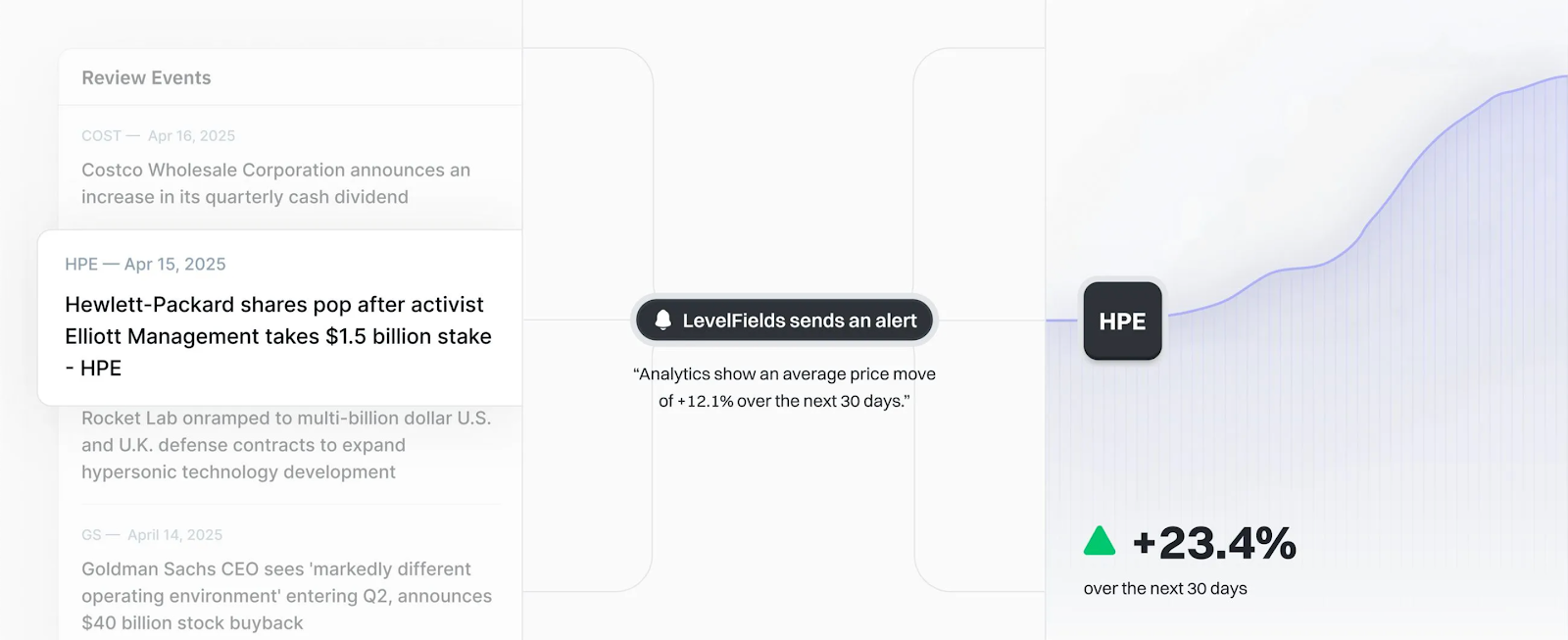
This allows investors to react to developments that may impact stock prices immediately rather than waiting for the next set of stock picks.
LevelFields's premium Level 2 service also monitors broader market events, making it valuable for those interested in stocks and other assets like ETFs and commodities.
In comparison to Morningstar, which offers detailed portfolio analysis and research on stocks and mutual funds, LevelFields focuses on delivering actionable and real-time data through a smart dashboard.
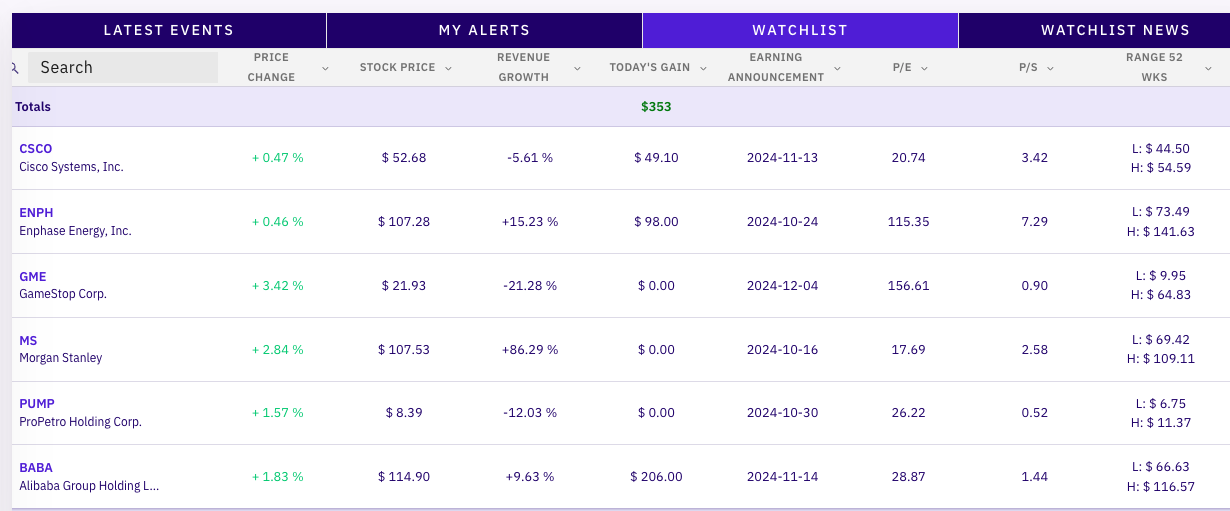
nstead of researching investments individually, LevelFields only surfaces high-probability setups and timely insights. It empowers users to respond quickly to important market events without constant monitoring.
Interested in capturing market opportunities as they happen? Join LevelFields today and trade 1800x faster!
LevelFields delivers real-time insights that help investors capitalize on key market events, such as Splunk's (SPLK) turnaround in 2022.
At that time, Splunk was reporting losses, with a Q3 2022 earnings report showing a loss of 20 cents per share. In October, an activist investor took a significant stake in the company, aiming to drive profitability and increase shareholder value.
Shortly after the activist's involvement, LevelFields flagged the event as a strong bullish signal, giving users early access to this opportunity. Following the investor's playbook, Splunk made strategic cuts and operational changes.
By Q3 2023, the company reported positive earnings of 71 cents per share, and its stock price soared. Over ten months, SPLK gained +40 percent, benefiting those who acted on the early alert.
This case study shows how LevelFields tracks impactful events, helping investors make informed decisions.
The platform focuses on high-value events, such as activist moves that historically lead to positive stock outcomes, to give users timely information they can act on.
If you’re looking for event-driven tools and real-time insights to stay ahead of market trends, LevelFields is the platform for you. Sign up today and take control of your investments!
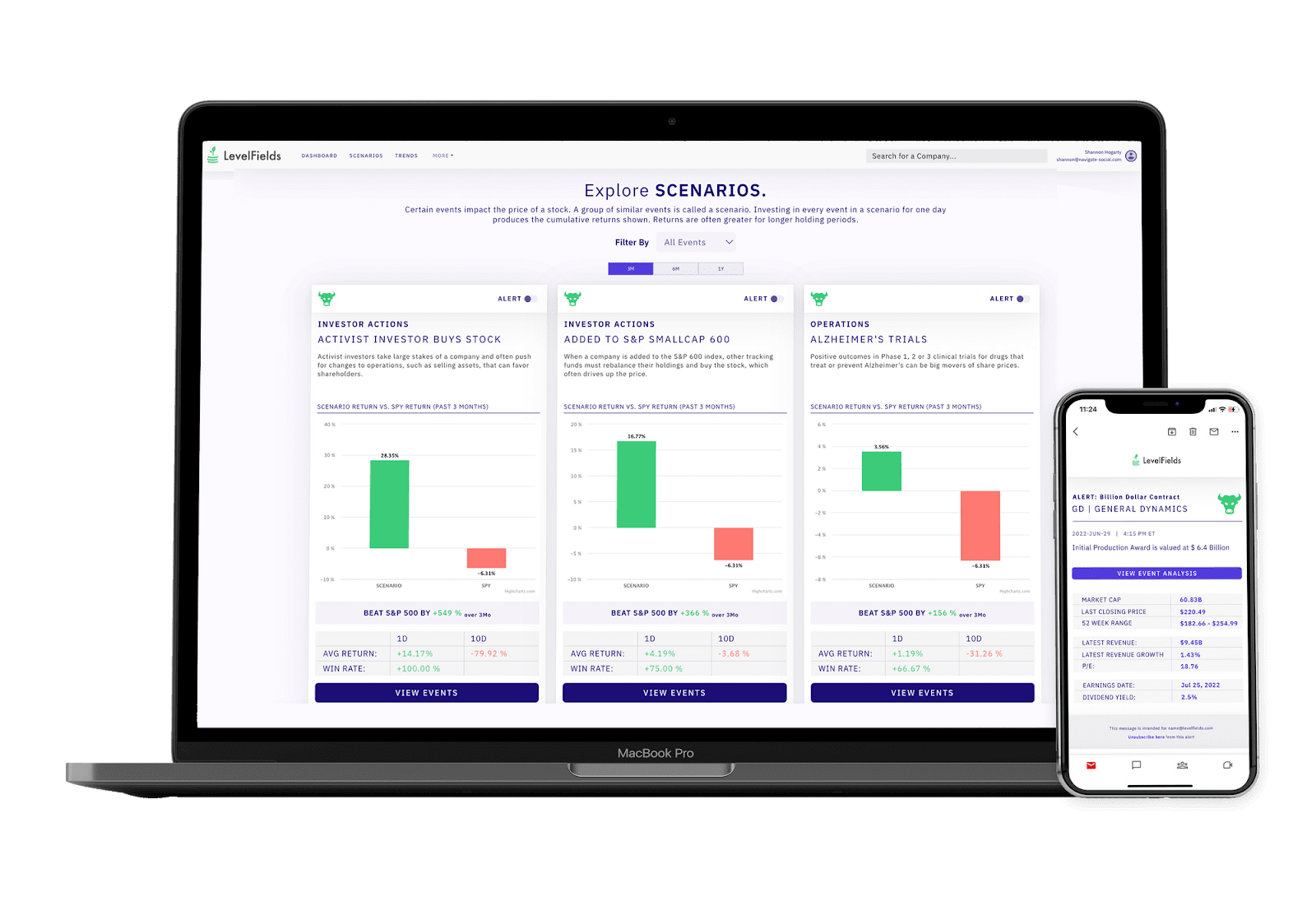
Ready to transform the way you trade? With LevelFields, you gain access to cutting-edge analytics that empower you to find better investments 1,800 times faster.
Its AI-powered platform analyzes over 1.8 million market events each month so that you can act on facts and not opinions.
Don’t leave your trading decisions to chance. Equip yourself with the tools to make informed, data-driven investments.
Join LevelFields today and start turning market insights into profits!
Choosing between Morningstar and Motley Fool depends on your investment goals, needs, and preferences.
Morningstar offers comprehensive research and analysis tools that cover stocks, mutual funds, and ETFs. It is best for investors who want to conduct their own investment research and manage their portfolios with detailed data.
In contrast, Motley Fool focuses on providing monthly stock picks through its Stock Advisor service. It is useful if you want to grow your portfolio over time with specific recommendations.
You'll find several investment platforms that are better than Motley Fool. One of them is LevelFields, which uses AI to analyze millions of events and data points proven to impact stock prices. You can react immediately to these market movers before the crowd and boost your returns.
Morningstar's leading competitors include Motley Fool, LevelFields, and Seeking Alpha Premium. The best option depends on your investment goals and needs.
Motley Fool suits those wanting curated stock picks, while LevelFields fits self-directed investors who want to stay ahead of market events. On the other hand, Seeking Alpha Premium helps users who require in-depth analysis and data-driven stock ratings.
The Motley Fool is highly regarded for its solid track record, actionable stock recommendations, and long-term investment ideas. It's among the best stock advisors with strong returns, especially for investors seeking curated picks rather than using a traditional stock screener.
Join LevelFields now to be the first to know about events that affect stock prices and uncover unique investment opportunities. Choose from events, view price reactions, and set event alerts with our AI-powered platform. Don't miss out on daily opportunities from 6,300 companies monitored 24/7. Act on facts, not opinions, and let LevelFields help you become a better trader.

AI scans for events proven to impact stock prices, so you don't have to.
LEARN MORE